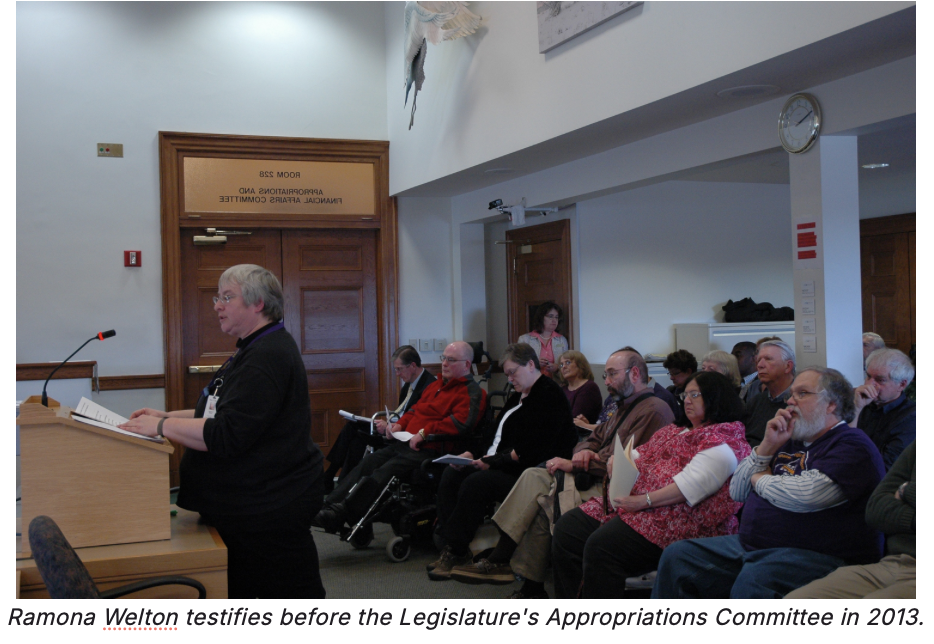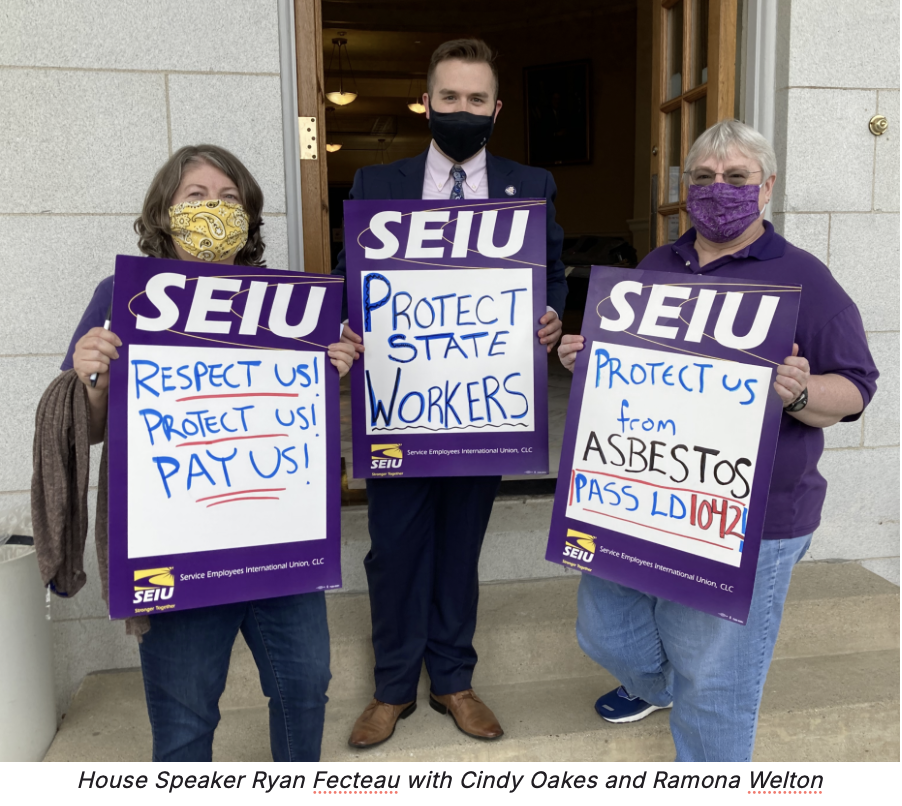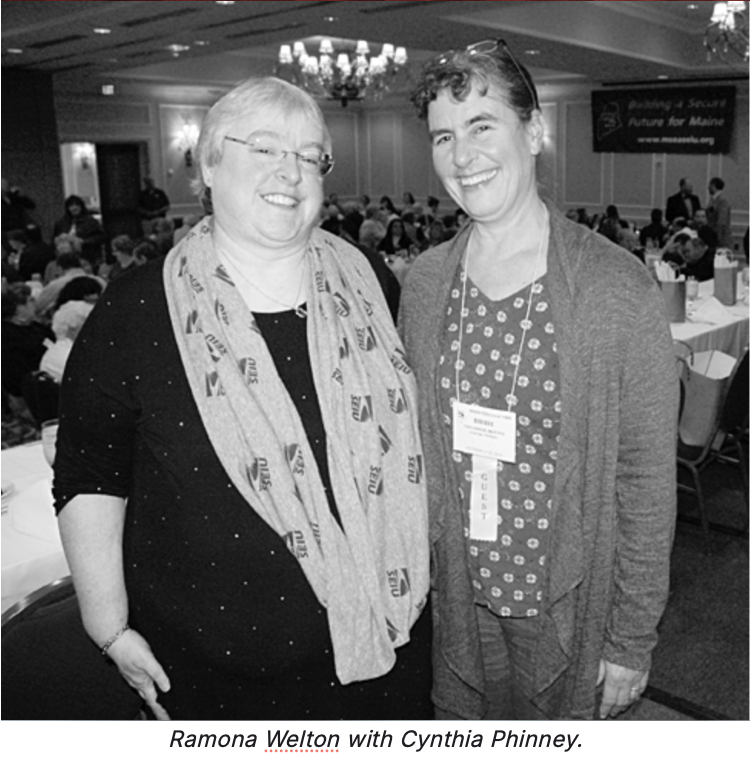Former MSEA-SEIU President Ramona Welton Reflects on Over 40 Years of Public Service

In July, former Maine Service Employees Association (MSEA-SEIU 1989) President Ramona Welton retired after 41 years of working for the Maine Bureau of Motor Vehicles.
"We cannot thank [Ramona] enough for her dedication to serving the people of Maine as well as her leadership and advocacy for her coworkers as the former president of Maine Service Employees Association,” MSEA wrote in a statement.
Welton grew up just outside Houlton in the little Aroostook County town of Hodgdon where she remembers picking potatoes as a child. After graduating the University of Maine in 1984, she returned home only to find that there were few jobs available in the area. Welton decided to apply for a job in state government as she had cousins who worked for the state. She started out as a file clerk for the Bureau of Motor Vehicles, where she ended up spending her four decade-career. There were no computers in those days, so they had to manually file all of the exam applications for drivers permits and drivers tests were all manually filed.
“We had to code the applications, file them and then pull them and refile them,” said Welton. “I spent my days sitting at a great big mess of rotary filing applications.”
MSEA steward Donna Doore, who later served in the Maine Legislature, became Welton’s mentor and convinced her to join the union. It wasn’t an easy sell. Welton had grown up in a conservative household and she didn’t grow up with an understanding of what unions did. Her father was retired military and her family worked for farmers or for the town.
“The ethos of the family was following rules, having structure and having a hierarchy. That's what we knew because of my dad's military background,” said Welton. "But Donna Doore came to me and she was very persistent. She was very good at reading people and at one point she just told me this is what I had to do.”

At the time, Welton worked in the Department of Transportation building and was part of the DOT’s main office chapter. After the BMV was moved to its own building in the early 1990s, Doore organized its own chapter. However, Welton was only earning about $300 every two weeks, so money was very tight and she started looking to save wherever she could. She ended up leaving the union so she could save money from the dues she had been paying.
“Everybody matures at a different level and at a different speed,” Welton recalled of that time. “I didn't understand what I was paying for until somebody literally could explain it or I could experience it.”
Like so many union members, what brought her back to the union was collective struggles. In Welton’s case, the state was trying to change the workers’ pay cycles and Donna Doore was once again there to educate and organize the BMV workers. But before she got too involved in her union, Welton wanted to understand it more deeply. She believed the best way to do that was to serve on MSEA’s finance committee.
“I wasn't born as an organizer or a union activist. I grew into it,” said Welton. “And in order to grow into it, I had to learn about it because it's not an innate ability for me.”
At MSEA’s annual meeting of 300 attendees, she decided to take the plunge and announce her candidacy for the finance committee. She didn’t know many people in the room at the time, but she won the seat. After serving on the committee for a while, in 2007 she set her sights on the executive board because she was dissatisfied with leadership at the time. She managed to win that election too.
“The union is very much like my family. We have a lot of squabbles.” Welton said. “Don’t go against my brother because I will stand to the wall with him. But it doesn't mean that I always get along with him and I won't fight with him.”

She noted that while people often perceive the union president to have the power, it’s really the board that has all the power. The president sets the agenda and provides the voice for the union.
After serving two terms on the board she decided to launch a campaign for vice president. While she very much liked and respected the current VP at the time, she felt she didn’t feel like he was fulfilling his obligations.
“In order to have a strong, healthy organization, you have to have candidates step up and run,” said Welton. “You have to give the membership a choice. So I chose to run and I was successful.”
Welton served in leadership during Governor Paul LePage’s term as he sought to dismantle unions while cutting the pensions of state workers and teachers to help pay for tax breaks for the wealthy. In 2017, Welton and her colleagues also had to deal with the second government shutdown in 27 years after LePage and Republicans decided to hold state employees hostage to extract more concessions from Democrats. She said bargaining was “interesting” during that time as the governor’s negotiating team played hard ball.
“We started at zero raises with LePage,” she recalled. “If he could have thought of a way to make us pay back wages, he would have. Well, he actually did because he froze our health insurance.”
After Governor Mills was elected in 2018, state employees could finally take a breather because they weren’t always on the defensive. However, the Governor kept the same bargaining team as LePage.
“Leopards don’t change their spots,” said Welton. “They never changed their process. They never changed their attitude, so it was not overly joyful for the bulk of that period.”
Welton said the main problem during Mills’ term is that so many different groups are competing for the same pot of money. The Governor has also ruled out reversing Governor LePage’s tax cuts for the rich that had been funded by cutting state employee pensions in the first place.
“I didn’t personalize it, even though what I had heard in the [Mills] campaign was not necessarily what I was hearing from the administration," she said. “I knew going in that Mills was a conservative Democrat. She wasn't so far left that we were going to literally get everything we wanted. Of course that doesn't stop us from asking for it.”
Welton noted that when she became MSEA President, Cynthia Phinney was also serving as the Maine AFL-CIO President, so that two of the largest labor organizations in the state were led by women. Nevertheless they were still working within a male dominated society. Her advice to women union members is to “know yourself and believe in yourself."
The reality is as a female, we continue to fight what we described in our generation as “the old boy school,” she said. “And it may be subtle and it may be behind different doors, but it is still in place.”

Welton said she is fortunate to have had great mentors in MSEA like former leaders Ginette Rivard, Bob Ruhlin, Mary Anne Turowski and others.
“These are people who paved the way for people like me to be successful,” she said. “And we owe it not only to them, but to the next generation to make sure that they have an opportunity to learn the lessons that people already have paid in blood. Now we're losing those people fast and furious, but we have to make sure the story of our union carries on because you can't take for granted what you have just because you have it today. Because it could be gone tomorrow.”
